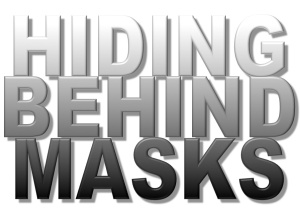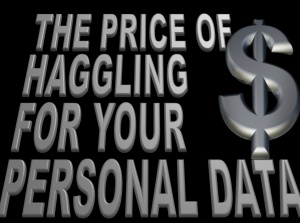== Hide from the Man? ==
 “Our world is becoming increasingly surveilled. For example, Chicago has over 25,000 cameras networked to a single facial recognition hub,” reads the URME (pronounced U R Me) site:
“Our world is becoming increasingly surveilled. For example, Chicago has over 25,000 cameras networked to a single facial recognition hub,” reads the URME (pronounced U R Me) site:
“We don’t believe you should be tracked just because you want to walk outside and you shouldn’t have to hide either. Instead, use one of our products to present an alternative identity when in public.” What product? A rubber mask bearing the likeness of URME’s founder Leo Selvaggio.
If lots of people go around wearing these masks the proto Big Brother system of all those cameras will be…
… ever so slightly inconvenienced, while store-owners and bank guards and mere passers-by will have their tension levels ratchet up.
Yeah yeah, I’ve heard it all. This is a cool stunt and it draws attention to our decaying yadda yadda. And it accomplishes nothing else. Except to help promote the never ending chain of whining from those who think we can protect freedom by moaning “don’t look at me!” (I lived in Britain in the 1980s, where the cameras were already blooming everywhere, inspiring me to write The Transparent Society. In Kiln People I portray how masks will provide only slight and superficial anonymity, till someone is motivated enough to scrupulously backtrack images.)
 Yes, proto Big Brothers are all over the place! And yes, the camera networks could help bring us Big Brother! I fear the same outcome and I am just as militant in opposing it. More so!
Yes, proto Big Brothers are all over the place! And yes, the camera networks could help bring us Big Brother! I fear the same outcome and I am just as militant in opposing it. More so!
Only there’s this. I know what works… what stands a chance of working. What has already worked well enough to give us the freedom that we do have….
…and it did not come from hiding…
…or whining “don’t look at me!”
== Wiretapping updated? ==
Strict-liability two-party consent eavesdropping laws seemed fair when they were passed in dozens of states, back in Stone Age days— like the 1960s — when the ability to record was unevenly possessed and when furtive recording seemed unfair. Today, it’s foolish for anyone to assume, at any point, that what they are saying has no chance of being played back, some other time. In particular, such two-party consent laws have been used to criminalize citizen recordings of their interactions with police and other government officials.
As reported here, the most important civil liberties matter in our lifetimes — certainly in thirty years — was hardly covered by the press. In 2013 both U.S. courts and the Obama Administration declared it to be “settled law” that a citizen has the right to record his or her interactions with police in public places. No single matter could have been more important because it established the most basic right of “sousveillance” or looking-back at power, that The Transparent Society is all about. It is also fundamental to freedom, for in altercations with authority, what other recourse can a citizen turn to, than the Truth?
(This was forecast in EARTH (1989) by the way.)
 It is important to take a balanced view… not to surrender all expectations of privacy, but to know that openness and accountability will let us both stay free and enforce a little privacy, or at least insist that we be physically left alone.
It is important to take a balanced view… not to surrender all expectations of privacy, but to know that openness and accountability will let us both stay free and enforce a little privacy, or at least insist that we be physically left alone.
In particular, the recent rulings about citizen recordings of police absolutely eviscerate the snarky-stupid shrugs of cynics who proclaim that it’s all defeat and spirals into Orwellian hell.
Let there be no mistake. The cynics are enemies of freedom, not its defenders. Their tirades of gloom undermine the confidence and can-do spirit of problem solving that might get us across this transition era.
Indeed, sometimes “looking back” works!
== Owning our data ==
 The Price of Haggling for Your Personal Data: This SLATE article discusses the notion that each of us might leverage and benefit from the economic value of our information.
The Price of Haggling for Your Personal Data: This SLATE article discusses the notion that each of us might leverage and benefit from the economic value of our information.
It is one (absurd) thing to declare “I own all the info about me!” and to demand others not look. That’s a non-starter and if we pass laws to forbid the mighty from looking at us, that will only make them furtive about it and ensure we’ll get no benefit. As Heinlein said: “The chief thing achieved by privacy laws is to make the (spy) bugs smaller.”
But it is reasonable to say that people have “interests” and “value” in their information and a right to derive royalties or a fee for its use, especially if some commercial interest is making money off it. Moreover it is in an open society that we might be able to track who is using our data and insist on routine and proper payment for such use. The idea of people controlling and selling their data for personal and economic gain—as Jaron Lanier describes in Who Owns the Future? and Doc Searls elaborated on in The Intention Economy: When Customers Take Charge—is gaining traction.
In this interesting article on Slate, John C Havens asserts that it’s not just about money: “But it won’t take hold until we answer a more deeply fundamental question: What are we worth as a whole?”
 Indeed, a number of Internet mavens over the years, including Jaron Lanier, have prophesied that citizens will – at some point – demand to benefit from the commercial use that major entities and corporations are deriving from information about hundreds of millions of people.
Indeed, a number of Internet mavens over the years, including Jaron Lanier, have prophesied that citizens will – at some point – demand to benefit from the commercial use that major entities and corporations are deriving from information about hundreds of millions of people.
Our data is being swapped about and – as author of The Transparent Society – I don’t find open information flows to be the problematic thing. It is the cutting out of us little guys from any participation in the value chain deriving from our data.
Indeed, the way our data is shuttled and sold is invisible to us!
An article by Gregory Maus — How Transparent Big Data Markets Could Better Protect Your Data…and Your Rights — suggests setting up transparent, privately-owned, but publicly-regulated markets for the data. “Imagine something like an Amazon, Alibaba, or New York Mercantile Exchange, focused on the purchase and licensing of Big Data. Suppliers could increase their markets, buyers could increase their options, and all transactions would be public record.”
Now comes the Hub of All Things (HAT) project. The HAT is building a database which will be owned by individuals who produce data in the first place. That includes social media data, energy use data and internet of things data from our homes, such as the goods you use or the medicines you take. Kind of vague, so far. Indeed, I am doubtful. But over time, we must as a society develop ways that each person benefits from a strong interest in his or her information.
 For more on Transparency, Privacy and Accountability
For more on Transparency, Privacy and Accountability













